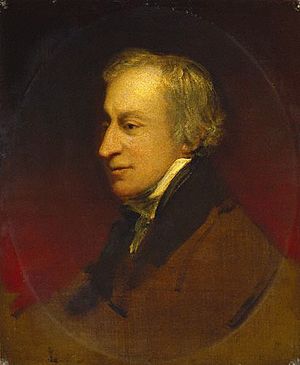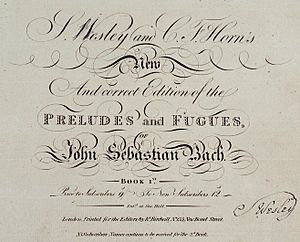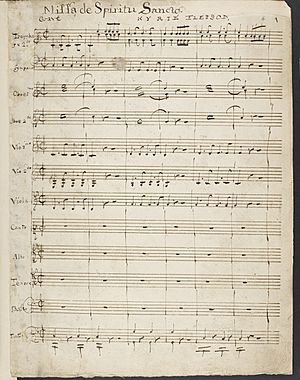Samuel Wesley (composer, born 1766) facts for kids
Quick facts for kids
Samuel Wesley
|
|
|---|---|
 |
|
| Born | 24 February 1766 Bristol South West England
|
| Died | 11 October 1837 (aged 71) |
| Occupation | organist and composer |
| Children | 7 (including Samuel Sebastian Wesley) |
| Parent(s) | Charles Wesley and Sarah Wesley |
Samuel Wesley (born February 24, 1766 – died October 11, 1837) was a talented English organist and composer. He lived during a time called the late Georgian period. Some people even called him "the English Mozart" because he was so good at music, just like the famous composer Mozart.
Contents
Samuel's Early Life and Family
Samuel was born in Bristol, England. His father was Charles Wesley, a well-known leader in the Methodist Church and a writer of many hymn tunes. His uncle was John Wesley, who founded the Methodist Church.
Samuel's first music lessons happened at home in Bristol. His mother, Sarah Wesley, loved to sing and play the harpsichord. The family enjoyed listening to hymns and music by Handel. Samuel also learned from David Williams, who was an organist at All Saints' Church. In 1778, Samuel moved to London with his family.
Family Life and Children
In 1793, Samuel married Charlotte Louise Martin, and they had three children. Later, Samuel had four more children with Sarah Suter. One of their sons, Samuel Sebastian Wesley (1810–1876), also became a famous organist and composer for cathedrals.
In 1784, Samuel decided to change his religion and became a Roman Catholic. This surprised his uncle, John Wesley. To celebrate his new faith, Samuel wrote a large and beautiful piece of music called the Missa de Spiritu Sancto. He dedicated this work to Pope Pius VI.
Samuel also joined a group called Freemasons in 1788. He became a very important member, serving as the Grand Organist for the main Masonic group in England from 1812 to 1818.
Samuel Wesley passed away in 1837 when he was 71 years old. He was buried in St Marylebone Parish Church in London.
Samuel's Amazing Musical Career
Samuel showed his musical gifts very early in life. As a young boy, he was known as a child prodigy, meaning he had amazing talents at a young age. His older brother, Charles, was also very musical. Samuel quickly learned to play the violin, harpsichord, and organ. By the time he was eight, he was already known for writing his own music and making up tunes on the spot.
His father, Charles, once wrote about Samuel:
When Samuel was eight years old, Dr Boyce came to visit us. He said, 'Sir, I hear you have an English Mozart in your house.' I called Sam to show his work. He had already written his Oratorio of Ruth. Dr Boyce looked at it carefully and was very pleased. He said, 'These songs are some of the prettiest I have seen. This boy writes music naturally, as well as I can do by rules and study.'
Samuel Wesley worked as a conductor, leading musical groups. He also taught music and gave talks about it. He was one of the first people in Britain to give public organ recitals, which were not common in churches at that time. Even though he was considered the best organ improviser in England, he never got a permanent job as an organist. This might have been because of his strong opinions or his personal life.
Playing for Felix Mendelssohn
Samuel's skill on the organ was so respected that he got to play for the famous composer Felix Mendelssohn in September 1837, just a month before Samuel died. Mendelssohn gave a concert, and Samuel, who was very weak, was encouraged to play. Mendelssohn stood by him and praised his playing. But Samuel replied, "Ah, Sir! you have not heard me play; you should have heard me forty years ago."

Samuel Wesley discovered the music of Johann Sebastian Bach sometime between 1796 and 1808. In 1810, he worked with Charles Frederick Horn to publish the first English version of Bach's famous work, The Well-Tempered Clavier. Their efforts helped many people in England discover and appreciate Bach's music.
Samuel's Musical Compositions
Samuel Wesley wrote a lot of music! Here are some of the types of pieces he composed:
- Over 120 pieces for the organ.
- 41 Latin motets (choral pieces) and a cantata (a vocal piece with instruments) called Confiteor tibi Domine.
- At least two Masses, including the Missa Solemnis and the Missa de Spiritu Sancto. The Missa de Spiritu Sancto was his biggest work, written for singers, a chorus, and a full orchestra.
- 6 symphonies and 4 orchestral overtures (pieces for an orchestra).
- 5 organ concertos, 4 violin concertos, and 2 harpsichord concertos (pieces for a solo instrument with an orchestra).
- 2 string quartets (for four string instruments).
- A piece called Sinfonia Obligatto for organ, violin, and cello.
- A quintet for strings, organ, and two horns.
- At least 65 piano pieces, including fun arrangements of popular tunes like "Jacky Horner" and "God Rest Ye Merry, Gentlemen".
- Many anthems (choral pieces for church).
- He also arranged music by other composers, like adapting Bach's organ works so they could be played on English organs of his time.
Many of his most famous pieces were written for the church, like the motet In exitu Israel. He also wrote secular (non-religious) music, such as the five-part madrigal "O sing unto mie roundelaie."
Sadly, much of his music was published and then forgotten, so it can be hard to find copies today. A lot of his work only exists as handwritten notes.
Samuel Wesley's music style was a mix of different periods: the late Baroque era, Classicism, and early Romanticism. This means his music had a wide range of sounds and feelings.
See also
 In Spanish: Samuel Wesley para niños
In Spanish: Samuel Wesley para niños
 | Chris Smalls |
 | Fred Hampton |
 | Ralph Abernathy |


